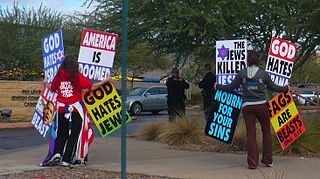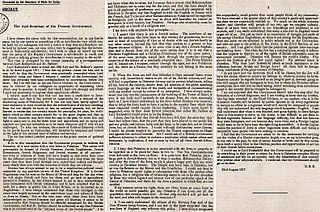Related Research Articles
Antisemitism is hostility to, prejudice towards, or discrimination against Jews. This sentiment is a form of racism, and a person who harbours it is called an antisemite. Primarily, antisemitic tendencies may be motivated by negative sentiment towards Jews as a people or by negative sentiment towards Jews with regard to Judaism. In the former case, usually presented as racial antisemitism, a person's hostility is driven by the belief that Jews constitute a distinct race with inherent traits or characteristics that are repulsive or inferior to the preferred traits or characteristics within that person's society. In the latter case, known as religious antisemitism, a person's hostility is driven by their religion's perception of Jews and Judaism, typically encompassing doctrines of supersession that expect or demand Jews to turn away from Judaism and submit to the religion presenting itself as Judaism's successor faith—this is a common theme within the other Abrahamic religions. The development of racial and religious antisemitism has historically been encouraged by the concept of anti-Judaism, which is distinct from antisemitism itself.
The history of antisemitism, defined as hostile actions or discrimination against Jews as a religious or ethnic group, goes back many centuries, with antisemitism being called "the longest hatred". Jerome Chanes identifies six stages in the historical development of antisemitism:
- Pre-Christian anti-Judaism in Ancient Greece and Rome that was primarily ethnic in nature
- Christian antisemitism in antiquity and the Middle Ages that was religious in nature and has extended into modern times
- Muslim antisemitism that was—at least in its classical form—nuanced, in that Jews were a protected class
- Political, social, and economic antisemitism during the Enlightenment and post-Enlightenment Europe that laid the groundwork for racial antisemitism
- Racial antisemitism that arose in the 19th century and culminated in Nazism
- Contemporary antisemitism, which has been labeled by some as the new antisemitism
New antisemitism is the concept that a new form of antisemitism developed in the late 20th and early 21st centuries, typically manifesting itself as anti-Zionism. The concept is included in some definitions of antisemitism, such as the working definition of antisemitism and the 3D test of antisemitism. The concept dates to the early 1970s.
Kenneth S. Stern is an American attorney and an author. He is the director of the Bard Center for the Study of Hate, a program of the Human Rights Project at Bard College. From 2014 to 2018 he was the executive director of the Justus & Karin Rosenberg Foundation. From 1989 to 2014 he was the director of antisemitism, hate studies and extremism for the American Jewish Committee. In 2000, Stern was a special advisor to the defense in the David Irving v. Penguin Books and Deborah Lipstadt trial. His 2020 book, The Conflict Over the Conflict: The Israel/Palestine Campus Debate, examines attempts of partisans of each side to censor the other, and the resulting damage to the academy.

Different opinions exist among historians regarding the extent of antisemitism in American history and how American antisemitism contrasted with its European counterpart. In contrast to the horrors of European history, John Higham states that in the United States "no decisive event, no deep crisis, no powerful social movement, no great individual is associated primarily with, or significant chiefly because of anti-Semitism." Accordingly, David A. Gerber concludes that antisemitism "has been a distinctly minor feature of the nation's historical development." Historian Britt Tevis argue that, "Handlin and Higham’s ideas remain influential, and many American Jewish historians continue to present antisemitism as largely insignificant, momentary, primarily social."

Kenneth L. Marcus is an American attorney, academic, and government official. He is the founder and leader of the Brandeis Center. He was the Assistant Secretary for Civil Rights at the United States Department of Education from August 6, 2018 through July 9, 2020, after which he resumed his position at the Brandeis Center.

Antisemitism has long existed in the United States. Most Jewish community relations agencies in the United States draw distinctions between antisemitism, which is measured in terms of attitudes and behaviors, and the security and status of American Jews, which are both measured by the occurrence of specific incidents.

Anti-Zionism is opposition to Zionism. Although anti-Zionism is a heterogeneous phenomenon, all its proponents agree that the creation of the modern State of Israel, and the movement to create a sovereign Jewish state in the region of Palestine—a region partly coinciding with the biblical Land of Israel—was flawed or unjust in some way.
Jill Jacobs is an American Conservative rabbi who serves as the executive director of T'ruah: The Rabbinic Call for Human Rights, formerly Rabbis for Human Rights-North America. She is the author of Where Justice Dwells: A Hands-On Guide to Doing Social Justice in Your Jewish Community and There Shall be No Needy: Pursuing Social Justice through Jewish Law and Tradition. This book includes chapters on tzedakah, poverty, health care, housing, labor, criminal justice, and environmental justice in America, seen through a Jewish viewpoint. She has served as the Rabbi in Residence of Jewish Funds for Justice and as the Director of Outreach and Education for Jewish Council on Urban Affairs.

The Office of the Special Envoy to Monitor and Combat Antisemitism is an office of the Under Secretary for Civilian Security, Democracy, and Human Rights at the United States Department of State. The office "advances U.S. foreign policy on antisemitism" by developing and implementing policies and projects to support efforts to combat antisemitism.

The Anti-Defamation League (ADL), formerly known as the Anti-Defamation League of B'nai B'rith, is a New York–based international Jewish non-governmental organization and advocacy group that was founded to combat antisemitism, bigotry and discrimination.

Criticism of Israel is a subject of journalistic and scholarly commentary and research within the scope of international relations theory, expressed in terms of political science. Israel has faced international criticism since its establishment in 1948 relating to a variety of issues, many of which are centered around human rights violations in its occupation of the West Bank and the Gaza Strip.
The "three Ds" or the "3D test" of antisemitism is a set of criteria formulated by Israeli human rights advocate and politician Natan Sharansky in order to distinguish legitimate criticism of Israel from antisemitism. The three Ds stand for delegitimization, demonization, and double standards, each of which, according to the test, indicates antisemitism.

The Louis D. Brandeis Center for Human Rights Under Law (LDB) is a 501(c)(3) nonprofit organization founded by Kenneth L. Marcus in 2012 with the stated purpose of advancing the civil and human rights of the Jewish people and promoting justice for all peoples. LDB is active on American campuses, where it says it combats antisemitism and anti-Zionism.
The working definition of antisemitism, also called the International Holocaust Remembrance Alliance definition of antisemitism or IHRA definition, is a non-legally binding statement on what antisemitism is, that reads: "Antisemitism is a certain perception of Jews, which may be expressed as hatred toward Jews. Rhetorical and physical manifestations of antisemitism are directed toward Jewish or non-Jewish individuals and/or their property, toward Jewish community institutions and religious facilities." Accompanying the working definition, but of disputed status, are 11 illustrative examples whose purpose is described as guiding the IHRA in its work, seven of which relate to criticism of the Israeli government. As such, pro-Israeli organizations have been advocates for the worldwide legal adoption of the definition.
With regard to the Arab–Israeli conflict, many supporters of the State of Israel have often advocated or implemented anti-BDS laws, which effectively seek to retaliate against people and organizations engaged in boycotts of Israel-affiliated entities. Most organized boycotts of Israel have been led by Palestinians and other Arabs with support from much of the Muslim world. Since the Second Intifada in particular, these efforts have primarily been coordinated at an international level by the Palestinian-led BDS movement, which seeks to mount as much economic pressure on Israel as possible until the Israeli government allows an independent Palestinian state to be established. Anti-BDS laws are designed to make it difficult for anti-Israel people and organizations to participate in boycotts; anti-BDS legal resolutions are symbolic and non-binding parliamentary condemnations, either of boycotts of Israel or of the BDS movement itself. Generally, such condemnations accuse BDS of closeted antisemitism, charging it with pushing a double standard and lobbying for the de-legitimization of Israeli sovereignty, and are often followed by laws targeting boycotts of Israel.
Zionist antisemitism or antisemitic Zionism refers to a phenomenon in which antisemites express support for Zionism and the State of Israel. In some cases, this support may be promoted for explicitly antisemitic reasons. Historically, this type of antisemitism has been most notable among Christian Zionists, who may perpetrate religious antisemitism while being outspoken in their support for Jewish sovereignty in Israel due to their interpretation of Christian eschatology. Similarly, people who identify with the political far-right, particularly in Europe and the United States, may support the Zionist movement because they seek to expel Jews from their country and see Zionism as the least complicated method of achieving this goal and satisfying their racial antisemitism.
Jews Against White Nationalism (JAWN) is a Jewish anti-racist organization based in the United States.
On May 25, 2023, the administration of US President Joe Biden unveiled The U.S. National Strategy to Counter Antisemitism. President Biden called his administration's plan the “most ambitious and comprehensive U.S. government-led effort to fight antisemitism in American history.”

Adela Cojab Moadeb is a Mexican-born American activist, author, podcaster, and law student. She is known for advocating against antisemitism and for Zionist causes. Most notably, she is known for her formal complaint against New York University under Title VI of the Civil Rights Act of 1964 for allowing antisemitic activities on campus.
References
- 1 2 3 Stracqualursi, Veronica; LeBlanc, Paul; Klein, Betsy (December 11, 2019). "Trump to sign order to interpret Judaism as a nationality". CNN. Retrieved December 11, 2019.
- 1 2 Baker, Peter; Haberman, Maggie (December 10, 2019). "Trump Targets Anti-Semitism and Israeli Boycotts on College Campuses". The New York Times.
- 1 2 3 4 Smith, Allan (December 11, 2019). "Trump to sign executive order targeting college anti-Semitism, Israel boycotts". NBC News.
- ↑ "Romanian Chairmanship" (PDF). International Holocaust Remembrance Association. 2016. Archived from the original (PDF) on October 24, 2017. Retrieved October 27, 2022.
- 1 2 "Questions and Answers on Executive Order 13899 (Combating Anti-Semitism) and OCR's Enforcement of Title VI of the Civil Rights Act of 1964" (PDF). United States Department of Education - Office for Civil Rights. January 19, 2021.
- ↑ "Findings and Recommendations of the United States Commission on Civil Rights Regarding Campus Anti-Semitism" (PDF). United States Commission on Civil Rights. April 3, 2006.
- ↑ "Anti-Semitism Awareness Act of 2018". ACLU. June 4, 2018.
- ↑ Perper, Rosie (December 11, 2019). "Jews angry over Trump's reported decision to define Judaism as nationality". Business Insider. Retrieved December 11, 2019.
- ↑ Levin, Bess (December 9, 2019). "Trump Goes Full Anti-Semite in Room Full of Jewish People". Vanity Fair. Retrieved October 27, 2022.
- ↑ Concepcion, Summer (October 16, 2022). "Trump attacks American Jews, says they must 'get their act together' on Israel 'before it's too late'". NBC News. Retrieved October 27, 2022.